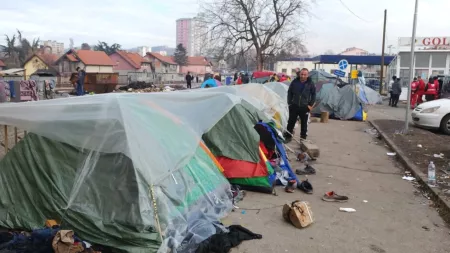Photo: Migrants and refugees camping in the open in Tuzla, Bosnia and Herzegovina.
28th of December 2020 - After the closure of the temporary refugee camp in Lipa (Bosnia and Herzegovina) 1,300 people are still left without any shelter, heating and protection from heavy snowfall and decreasing temperatures. CARE International urges local and European authorities to step up their efforts to provide proper shelter to hundreds of migrants stranded in Lipa as well as the more than 2,000 migrants living outside of the camp facilities.
“Closing the camp in Lipa (one day before Christmas) was already inhumane, but now the former residents find themselves in a life-threatening situation. Without any heating and proper clothing 1,300 migrants are forced to sleep outside because they have nowhere to go. Some of them were basically left with sandals in the snow”, says Sumka Bucan, CARE Regional Director Balkans.
The refugee camp Lipa may not seem as a proper accommodation, especially in the wintertime when temperatures go below zero degrees, but has still provided at least minimal shelter from wind, rain and snow.
“We acknowledge that citizens and authorities of Una Sana Canton, a region bordering Croatia and the EU, are facing severe challenges and have been bearing the burden of the migrant crisis from day one, but we believe they will not allow people who are seeking help and shelter to die in the cold. Bosnian authorities and international organisations have to be able to provide a life-saving alternative until a better solution has been found. CARE demands unconditional, lifesaving assistance for the migrants who are currently facing a situation of life and death due to the decreasing temperatures”, Bucan adds.
CARE has been assisting migrants in the region since 2015 by providing food, non-food winterization items and protection. CARE is urging all actors to ensure that available resources are used to meet basic humanitarian needs.
